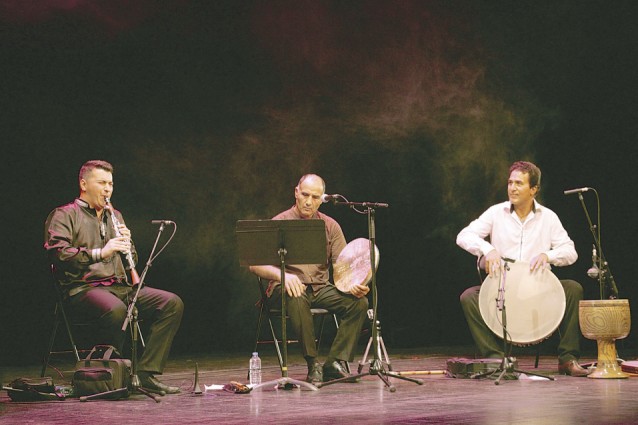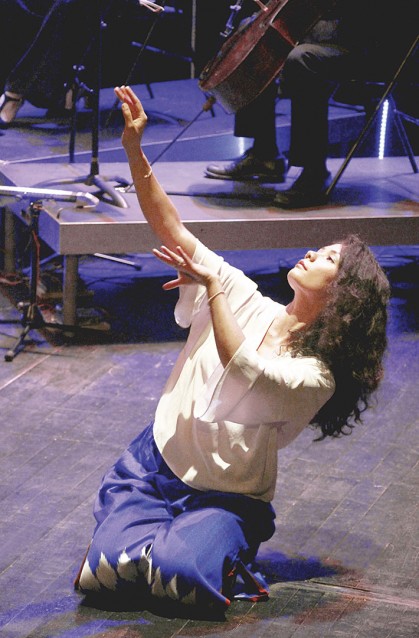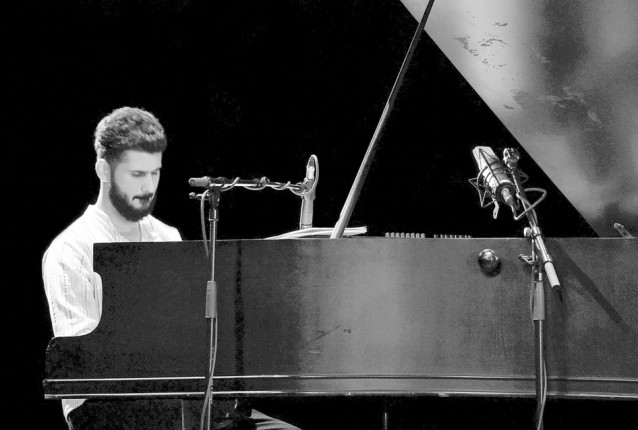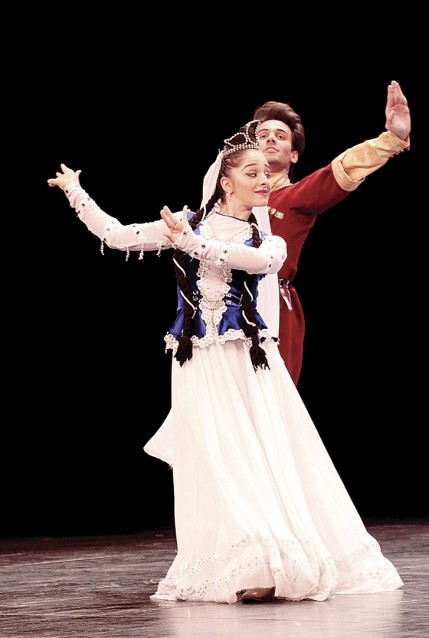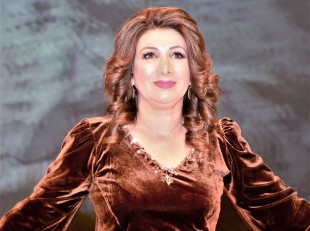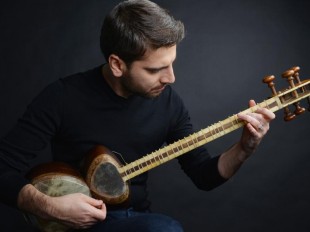Despite its reputation as an industrial city, Mulhouse is also often a space for various cultural festivals and events and one of them we managed to attend. This was the Les 2 Mondes (2 Worlds) festival, which from 14-17 September embodied the idea of multiculturalism by bringing together Turkish and Western cultures. The choice of Mulhouse as the festival’s host was no coincidence since its initiator and organiser, the composer Pierre Thilloy, hails from here. An interest in Azerbaijan transpires all of Thilloy’s work and is reflected in the special attention he gives to Azerbaijani musical traditions.
Kazakh folk
Azerbaijani music’s entry onto the European musical stage could boldly be described as a fait accompli. At the festival Les 2 Mondes it was joined by its Turkic brother – the Kazakh epic musical tradition of akyn, and nearer the end, there was music by Azerbaijani composers in light of European classical music traditions. What united these concerts wasn’t only a shared ethnic origin, but also a distinct historical representation of the different genres within these cultures. By this I mean the vibrant cultural legacies of Azerbaijan, Kazakhstan and Uzbekistan.
Immediately after the opening of the festival, the second day was dedicated to the culture of Kazakhstan. A very interesting art project, concocted by folk performer Aygerim Yersainova and attracting our attention with the very familiar name Dede Qorqud, brought a fusion of music and literary epic. It was delivered through the very beautiful sound of Kazakh folk instruments - the ancient jetygen, kobyz and shan kobyz, the saz-surnay, whose tones are linked with the powers and occurrences of nature, the epic kobyz and shan kobyz, wonderfully emphasising the beauty of the ancient Turkic legend, and also the part of the narrator (performed by Lucie Dupuich). The musical intention of the project will stay with the audience forever: the beauty of the ancient Turkic legend and epos was brought to life thanks to the tender performance of Aygerim Yersainova, in her delivery and expression of the national folk style, accompanied by the elegant dancing of traditional Uyghur dancer Mukaddas Mijit.
Aygerim Yersainova (folk musician, President of the Korkut Kazakh cultural centre in France):
In general I’m a fan of Azerbaijani music culture. When I was working at an international music organisation and they offered us the choice of a certain department of culture and musicians, everyone wanted a country from the Turkic world. That was when I chose Azerbaijan, as an area of study and cooperation in cultural projects. I became really interested in Azerbaijani mugham, because it’s a very fine vocal and instrumental art. I once even had to perform mugham as a khanende, when we had guests from Azerbaijan.
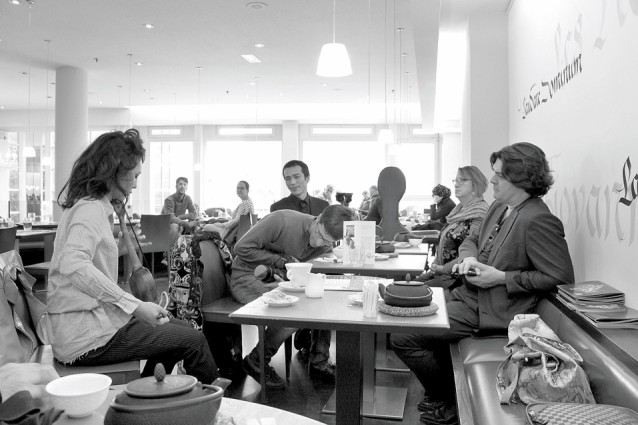 Meeting with Pierre Thilloy: Aygerim Yersainova (far left), cellist Dilshod Nazarav (third from left) and Pierre Thilloy (right)
Meeting with Pierre Thilloy: Aygerim Yersainova (far left), cellist Dilshod Nazarav (third from left) and Pierre Thilloy (right)
This is the first of Pierre Thilloy’s projects that I’ve been involved in. We were introduced to one another by the Azerbaijani cultural attaché Ayaz Gojayev, having found out that Pierre was very interested in the Dede Qorqud project. Since I’d taken part in Novruz concerts in Paris before, gathering the Turkic world, and since before this I’d worked in an international Turkic organisation and was the soloist for the Dede Qorqud project in UNESCO in 2015, all this contributed. And now Pierre Thilloy is composing pieces for these instruments.
I’m very happy with the organisation and with the diversity and professionalism of those taking part in the festival. It’s a wonderful opportunity to exchange experience and information in culture and performance.
An evening of jazz
On the second day it was jazz music’s turn when an evening of jazz was presented through an interesting Eastern group of Azerbaijani musicians – composer and jazz pianist Etibar Asadli, khanende Sahib Asadov, clarinet and balaban player Seddam Novruzbeyov and a guest from Iran, tompak player Mostafa Amidi Fard.
For the French, Mulhouse public, the programme was undoubtedly enlightening, for besides ethno-jazz compositions, there were also Azerbaijani mughams – the majestic Rast, the light and cheerful Mahur; the lyrical folk song Bağçada güllər (Flowers in the Garden) delivered the entire beauty of the Segah mugham, then there were the songful and love-filled Dilkesh and Bayaty-Shiraz. Etibar yet again uncovered a new dimension to jazz performance, by not only interpreting folk standards but also wonderfully performing his own jazz compositions.
This is how he will be remembered in the piece Islimi (Islimi is the name of a pattern in carpet art) where he created a songful melody in the Shur mode in the style of a folk song. In Dedicate, which gave a clear nod to the great Azerbaijani jazz musician Vagif Mustafazade, the beautifully constructed intro, played on a melodica, was remarkable and smoothly set up the improvisational part of Mustafazade’s famous March. The composition I’m Late brought contrast, with its pulsating rhythm, and theme, maintained in the Shur and Dilkesh harmonies, that unravelled against a background of rich electronic tones.
Etibar Asadli (composer and jazz pianist):
Pierre Thilloy is a friend and promoter of Azerbaijani culture, because he’s created many projects, concerts and festivals promoting our musical culture and legacy. We accepted his invitation to the Mulhouse music festival with great pleasure and decided to promote our folk music culture, above all by familiarising the French public with Azerbaijani mughams. With this aim, my father, the khanende Sahib Asadli, our colleague and balaban player Seddam Novruzbeyov, the splendid Iranian musician Mostafa Amidi Fard and I prepared a project uniting various stylistic threads coming from jazz-rock, ethno-jazz, and also various parts of our mughams.
The festival itself will also be remembered for its many genres. Besides my native Azerbaijani culture, space was given for the music, dance, and epic legacy of other Turkic peoples such as the Kazakhs and Uzbeks. The idea of the uniting and mutual enriching of two worlds – as Thilloy declared the main motto of the festival – is something I also always include in my various projects; this synthesis of cultures is always interesting for me. Therefore I want to thank all the organisers of the Les 2 Mondes festival, led by my dear colleague Pierre Thilloy.
And chamber music
Uzbekistan was partially presented. The Samarkand String Quartet put on an evening of chamber music, built upon epic and lyrical components borrowed from Kazakh and Azerbaijani folk music, such as the song Korkut and Azerbaijani mugham rengs (instrumental dance-like interludes), as well as the works of various different composers. The parts of Khayyam Mirzazade’s Preludes, Anor Hazarov’s Waltz and oriental style pieces by Pierre Thilloy himself, alternating in an unhurried sequence, accompanied by dance performances by Mukaddas Mijit, formed one grand Eastern composition.
But the inclusion of the Concerto Grosso by Khayyam Mirzazade, a well-known Azerbaijani composer, was a truly pleasant surprise. Strikingly dynamic in its development and with very clearly contrasting parts, the concert performed by the Mulhouse Théâtre de la Sinne Symphony Orchestra, directed by the young conductor Fuad Ibrahimov, had a softer sound. In its smoother contrasts the main essence fell on the Adagio, which was full of the spirituality and concentration of its meditative origins. For its incredible modernity and philosophical lyricism, the concert also stood out among the other classical masterpieces. Close in terms of figurative mood, the Adagio of Samuel Barber and the Concerto Grosso of Khayyam Mirzazade formed the first section of the evening.
Pierre Thilloy’s Khojaly 613
Later, having continued the concert with one of the bright masterpieces of 20th century musical avant-garde, one of the most extravagant creations of the historic “French Six” - Bull on the Roof by Darius Milhaud - the orchestra finished its performance with the symphony opus Khojaly 613 by Pierre Thilloy, which is already well known to the European public. I should mention that every performance of this piece, composed with great understanding and empathy towards the historical events that took place in the Azerbaijani village of Khojaly, produces a newly powerful impression. Whether in an expanded or chamber composition, whether in a visualised or ordinary format - Thilloy’s opus equally finds its way to the listener’s heart.
Also worth emphasising was the exquisite and highly professional performance of our compatriot Sabina Rakcheyeva, who with great skill and emotional penetration into the music, made her contribution - I would say - of the primary role. Given the strong emotional effect, which once again inspired and enraptured listeners, I wanted to hear the opinion of the performer herself. Sabina Rakcheyeva (violinist, Arts and Cultural Advisor at TEAS):
The Khojaly piece by Pierre Thilloy has a special emotional effect on me every time, because as the first performer of the violin part in this composition, I worked very hard on the piece together with the composer. I admit, in Thilloy’s composition, which has been reworked many times for different orchestras, every time you perform it you find a new dimension, a new feature. Overall, I want to point out that in organising his projects and festivals Thilloy tries to find a new form, to uncover something from a different angle. For example, this time he also invited musicians from Kazakhstan to his project. They, just like us, performed their classical, modern and folk music, gave performances on folk instruments, and this is a consequence of the globalisation of our era.
I want to emphasise another important point - that in his projects Thilloy gives a special attention and place to our music, its diverse genres. This comes from the fact that Pierre worked in Azerbaijan for a long time and was interested in our musical culture and since then has had his own relationship with it. Many premieres of pieces by Azerbaijani composers have happened thanks to him. He also gave me the opportunity to meet up again and collaborate with my friend from college, the conductor Fuad Ibrahimov. I want to thank Pierre Thilloy as the organiser and initiator of such a wonderful festival for introducing new details for me every time and I want to wish him success in attracting new performers.
Fuad Ibrahimov (conductor):
The 2 Worlds music festival left a really deep impression, you could even say that we re-discovered a lot for ourselves. I can’t not mention the skill of the Stars of Baku ensemble, led by Yusif Kazymov, which delivered the beauty of the world of Azerbaijani dance so masterfully. The festival opened with this scintillating evening of dance.
In terms of the symphony concert, which I conducted, what struck me was the kind, tender attitude of the members of the Mulhouse Symphony Orchestra. The composer of the Concerto Grosso, our respected composer Khayyam Mirzazade, regarding the second part of the sequence presented the musicians with a difficult task – to play the whole Adagio in one breath, and they tried in every way possible to do what he asked.
During rehearsals I noticed the incredibly precise expression in the Khojaly piece by Pierre Thilloy: the details subtly chosen by the author, the features expressing the entire dramatic essence of the piece. Echoes from what happened in Khojaly were clearly audible in the part of the percussionists – the bombardments, gunfire, disturbing call of the sirens. Equally striking was the part of the cellist. Overall, Thilloy’s composition affects everyone – both the dramatism and the pain are delivered sensitively here.
Alain Toiron, (clarinettist and soloist of the Mulhouse Symphony Orchestra):
The 2 Worlds festival above all introduced me to the sincere and wonderful public. It was immensely interesting to perform Pierre Thilloy’s Khojaly piece for the first time, because at the foundation of its dramatic core are real events; bloody events and terrible pages in the history and fate of the Azerbaijani people. Working on Thilloy’s composition, I became interested in Azerbaijani folk and the music of Azerbaijani composers. Since I’m more of a classical performer myself, here I discovered a new strength of impact and a new sound. I found the freedom and daring initiative in it which is lacking for me in classical music, especially the rhythmic intensity.
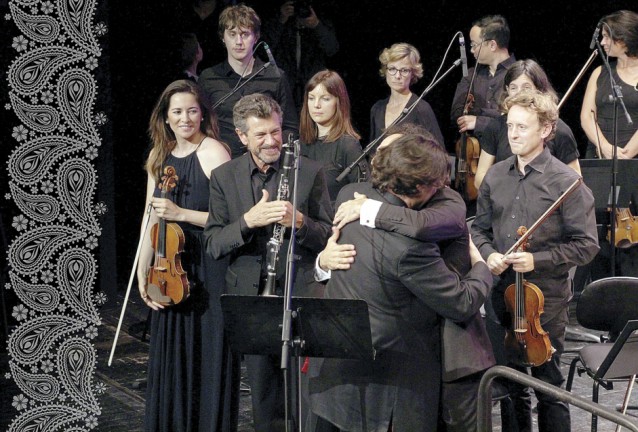 The festival draws to a close following the performance of Khojaly 613. (From left) soloists Sabina Rakcheyeva and Alain Toiron; Pierre Thilloy, Fuad Ibrahimov and the Mulhouse Symphony Orchestra
The festival draws to a close following the performance of Khojaly 613. (From left) soloists Sabina Rakcheyeva and Alain Toiron; Pierre Thilloy, Fuad Ibrahimov and the Mulhouse Symphony Orchestra
I want to wish success to this wonderful tradition, which brings people and performers together for tremendous dialogue!
The only thing left as the author of these lines is to thank all the sponsors and organisations that supported this wonderful celebration of music in Mulhouse, in particular – The Embassy of Azerbaijan in France led by Ambassador Elchin Amirbekov, the Centre of Azerbaijani Culture and the cultural attaché, Ayaz Gojayev, and the European-Azerbaijan Society (TEAS) for the opportunity to enjoy this wonderful event that took place in distant, historical Mulhouse.
About the author: Turan Mammadaliyeva is a jazz and mugham expert and frequent contributor for Visions.